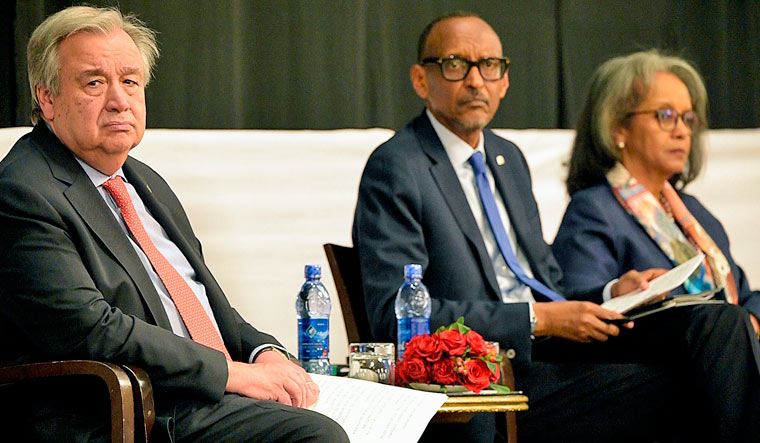Rwandan President Paul Kagame urged governments and members of the private sector from across Africa to collectively towards funding healthcare systems on the continent. Kagame was speaking at the African Leadership Meeting on Investing in Health which took place at the 32nd Ordinary Summit of the African Union Summit in Addis Ababa, Ethiopia.
The reformist who was at the chair of the African Union will pass on the baton to Egypt as he steps down. Egypt will more likely focus on security issues than expanding the powers of the body.
Egyptian President Abdel Fattah al-Sisi will officially take over the post of ceremonial head of the AU which rotates between the five regions of the continent at the start of a two-day summit in Addis Ababa.
Kagame has been a man who has fulfilled the the promise of visionary and progressive leadership. He has also ensured security and stability and strengthened political and social institutions in his country. Even though Kagame steps down, will continue serving as a member of the troika. He will also continue to lead the AU institutional reform process as entrusted to him by African Heads of State and Government during the AU Summit in Kigali in 2016.
The heads of the state will have crises faced by the continent as part of their agenda. The summit will also focus on institutional reforms, and the establishment of a continent-wide free trade zone.
The Continental Free Trade Area (CFTA) was agreed by 44 nations in March 2018, but only 19 countries have ratified the agreement, with 22 needed for it to come into effect.
also read
- WATCH | Guinea Nzerekore football riot deaths: Scary videos of violence, overflowing morgues and politics, what we know so far
- Malaria treatment crisis in Africa: New study finds resistance to key drug
- How Equatorial Guinea sex tape leak is fuelling anti-women narrative as victims include President's sister, wives of officials
An important part of AU's 'Agenda 2063', is a single market conceived as a strategic framework for socioeconomic transformation. Cairo is backing the initiative, but analysts say it will be less likely to focus on the financial and administrative reforms pushed by Kagame.
The new chair Sisi is however expected to focus more on security, peacekeeping and post-war reconstruction, issues closely tied to the AU's 2019 theme of "Refugees, Returnees and Internally Displaced Persons".
"Egypt has an interest in Africa, they want to strengthen their position on the African continent and they don't want to be seen as a country only focused on the Arab world," said Liesl Louw-Vaudran, an analyst at the Institute for Security Studies. Recently, UN Secretary-General Antonio Guterres said that peaceful elections in DR Congo, Mali and Madagascar, as well as peace deals in South Sudan and Central African Republic and the truce between Ethiopia and Eritrea, were signs of a "wind of hope" on the continent.
Kagame, who has been leading institutional reforms since 2016, pushed for a continent-wide import tax to fund the AU and reduce its dependence on external donors, who still pay for more than half the institution's annual budget.
The move however has been resisted by some member states, along with reform of the AU Commission, its executive organ. In November 2018, most states rejected a proposal to give the head of the AU Commission the power to name deputies and commissioners.
Egypt, like other regional heavyweights like Nigeria and South Africa is not keen on a powerful AU.
Especially because Cairo has "never forgotten" its suspension in 2013 after Egypt's army deposed Islamist president Mohamed Morsi, who in 2012 became the country's first democratically elected president, the diplomat said.
"The AU and the AU commission are only as strong as its members want them to be. Unlike the EU, African countries have not transferred some of their sovereignty to the AU." Kagame suffered a crushing blow from the AU after expressing "serious doubts" about the results of Democratic Republic of Congo's recent presidential election, which was officially won by Felix Tshisekedi.
The whole issue, including the results being disputed by the Catholic church, which were validated by DRC's constitutional court and saluted by continental heavyweights South Africa, Kenya and Egypt, was an was an embarrassment for the AU. It showed the limitations of what the AU chairperson can do," said Jobson.
Amnesty International expressed fears that Egypt's chairmanship could undermine human rights mechanisms in the AU.


